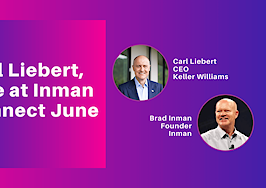The Inman community will gather virtually for Connect, June 15-17. It’s a powerhouse lineup of speakers, and our focus is on the New Normal: what business looks like on the other side of the pandemic. Let this conversation serve as an appetizer, and don’t forget to grab your ticket to June’s Inman Connect before prices go up.
It’s a testament to Keller Williams’ clout that today, after more than three and a half decades, it remains one of the most talked about companies in real estate. From evolving, in the words of founder Gary Keller, into a tech company to a rumored upcoming debut on the stock market, the firm remains a force.

Carl Liebert
To get a sense of what’s on the horizon, and to better understand how the company views the housing landscape, Inman recently sat down for a phone interview with CEO Carl Liebert — who joined Keller Williams last fall. During the conversation, Liebert discussed a potential initial public offering (IPO), the current inventory shortage, and changing consumer preferences. And while the exact details of what awaits Keller Williams may still be to be determined, it’s clear that the company is bullish about the future.
What follows is a version of Inman’s conversation with Liebert that has been edited for length and clarity.
Inman: I wanted to ask the question that’s on everybody’s mind. So, is a Keller Williams initial public offering coming in the near future and what can you tell me?
Carl Liebert: I think what’s really important — and this is something Gary and I spend a lot of time talking about — is that we’re preparing the company for optionality and how we think about our future. Gary put us on this path to be a tech company and to build a technology platform for our agents and their homeowners. And one of the most important parts of that is how we think about this company and its structure from a capitalization perspective.
So Gary and I came together to have this pact with one another that we want to be able to control our destiny. To pull the companies together under one holding company, which was dubbed KWx, and then from there allow us to go explore options that make the most sense, not only for Gary and his investors but also our partners and our franchisees.
There’s more to come there. But certainly we built the leadership team that allows us to choose our own destiny and take it from there. But we think there is ample room and opportunity for KWx and Keller Williams to go do something big in the future.
Any hints on the timeline over which that big thing might come to fruition?
I think there’s a lot of work to do to prepare us to have that optionality. And I think as we consider [Keller Williams Realty, Inc.] that was founded in 1983 that’s been so successful, as well as whether it’s worldwide or our Keller Mortgage or Keller Offers business, we’ve started the work of putting those companies together under the holding company structure. And step one in any process is to structure your company appropriately so you can consider the value of all these incredible assets that Gary and his partners have built.
So that work as been well underway for several months. We’ll have that work completed later in the summer and from there we’ll be able to start talking about what our future plans are. But until that work is done we can’t even put ourselves on any sort of timetable.
Let me pivot a bit here. There’s obviously a big inventory shortage going on right now. What do you make of it? For example how long do you see it lasting?
I see it lasting for a while. What you’re experiencing is in every industry that was impacted by COVID, supply chains have been optimized globally. So looking at lumber and lumber prices. There’s plenty of timber but there’s not enough mills to get that lumber to homebuilders.
The supply chain, it can’t snap back that quickly in housing because it depends on so many things, whether that’s lumber or skilled trades or labor.
We don’t see the demand for homes declining from the consumer perspective. And we see lots of ramping up from builders and those kind of things, but it’s going to take at least two or three years for that equilibrium to be reached. So we’re very bullish on housing continuing. And as long as rates stay where they are, I think we’re in for an interesting few years ahead.
Speaking of rates, do you see them staying in the neighborhood that they’re in right now?
The Fed chairman, [Jerome Powell], he’s been pretty transparent on what his thoughts are. And Treasury Secretary Janet Yellen, the two of them are working closely together. I think there’s a fear of inflation and what that would do to impact rates. I don’t have a crystal ball but as we talk to our economists and spend time with them, I think there’s a short term blip in this inflation conversation.
But I think it’s going to be a nice recovery coming out of the pandemic. I don’t think it’s going to overheat the economy.
There’s a lot of folks who disagree with that, but as long as inflation remains somewhat in check or moderated by wages, I think you’re going to see rates stay very consistent to where they are today.
Let’s talk about the agent experience. Things have changed considerably during the pandemic and I’m curious if you see any of that sticking around. How does the last crazy year alter what it means to be an agent?
I’m so proud of our agents. The agility that our agents showed. Our agents were so resilient and pivoted to being able to do virtual open houses and being able to work from home and not have to go to the market centers or their offices.
I like to call this a new abnormal period. People say, “when will things go back to normal.” But I like to say we’re in a new abnormal.
What that means is some things are going to remain, and some things are going to change permanently. What we’re trying to do is watch closely what that means. Are people going to keep having virtual open houses, or are people going to rush back, saying, “I want to see the home, I want to touch the home.”
I think it’s going to depend on individuals. It’s going to come down to, “do I feel comfortable? Are people vaccinated? Do I feel safe?”
Agents might have to alter their behavior to support what individuals’ personal safety and comfort levels might be.
But I also believe there will be a great need for people who want to get back and, I’ll call it, kick the tires and see the home. But I don’t think it’s going to be consistent. It’s going to go back to this new abnormal we’re going to be in.
During the pandemic we’ve seen some significant shifts among consumers. People can work remotely, they can move around more easily, etc. Are these changes on the consumer side permanent?
I do believe the technology, the digitization of what clients want, has accelerated several years into the future because they’ve become more comfortable with using, for example, grocery deliveries. Or streaming movies.
What’s going to be curious for all of us to watch is what automation you’ve done to make your life simpler and easier during the pandemic stays. And then what automation you did because you had to do it during the pandemic, and now you’re going to go back to what you did before
I think for us, working in a hybrid remote way, is here to stay. I believe it, I’m watching it with our own employees for KW here in Austin. I’m hearing it from a lot of our agents. Simultaneously I’m hearing from a lot of agents who want to go back to their market centers and be with their counterparts and spend time together.
What I believe though, from a consumer perspective, is people want a home that has a place where they can work and which gives them optionalities, where they don’t necessarily have to go to the office. What’s that look like? Well, if I’ve got two or three kids I really want a space, or a home office, where I can do Zoom or I can FaceTime or whatever platform my company uses, and I can separate myself. So that extra room in your home is — especially if you’re a professional and you can work remotely — I see that as a part of the fabric going forward.













